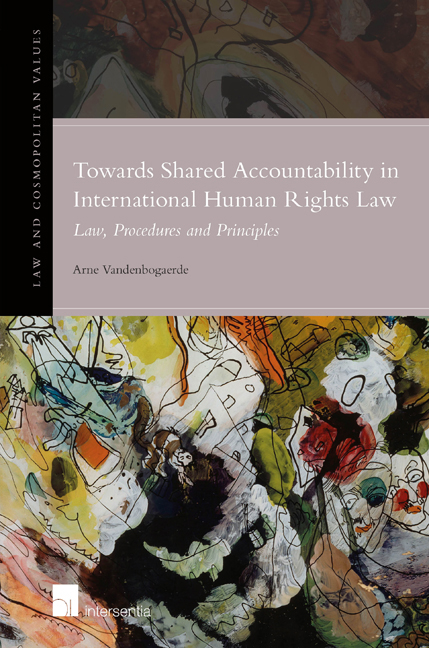Book contents
- Frontmatter
- Preface
- Acknowledgment
- Contents
- List of Abbreviations
- Chapter 1 Introduction
- PART I UNDERSTANDING ACCOUNTABILITY
- PART II ACCOUNTABILITY IN INTERNATIONAL AND REGIONAL HUMAN RIGHTS LAW: PROCESSES, PRACTICE AND LIMITS
- Chapter 3 State Reporting Procedures at the International and Regional Level
- Chapter 4 Individual, Collective and Inter-State Complaint Procedures in the International and Regional Accountability Framework
- Chapter 5 Inquiry Procedures in the International and Regional Accountability Framework
- Chapter 6 International Peer-Review Accountability Mechanisms
- Chapter 7 Special Procedures in the International and Regional Systems
- Conclusions Part II
- PART III CONTOURS OF A MULTI-DUTY BEARER FRAMEWORK
- Conclusion: Contours and Viability of A Multi-Duty-Bearer Framework
- Bibliography
- Law and Cosmopolitan Values
- Instructions to authors
Chapter 4 - Individual, Collective and Inter-State Complaint Procedures in the International and Regional Accountability Framework
from PART II - ACCOUNTABILITY IN INTERNATIONAL AND REGIONAL HUMAN RIGHTS LAW: PROCESSES, PRACTICE AND LIMITS
Published online by Cambridge University Press: 13 December 2017
- Frontmatter
- Preface
- Acknowledgment
- Contents
- List of Abbreviations
- Chapter 1 Introduction
- PART I UNDERSTANDING ACCOUNTABILITY
- PART II ACCOUNTABILITY IN INTERNATIONAL AND REGIONAL HUMAN RIGHTS LAW: PROCESSES, PRACTICE AND LIMITS
- Chapter 3 State Reporting Procedures at the International and Regional Level
- Chapter 4 Individual, Collective and Inter-State Complaint Procedures in the International and Regional Accountability Framework
- Chapter 5 Inquiry Procedures in the International and Regional Accountability Framework
- Chapter 6 International Peer-Review Accountability Mechanisms
- Chapter 7 Special Procedures in the International and Regional Systems
- Conclusions Part II
- PART III CONTOURS OF A MULTI-DUTY BEARER FRAMEWORK
- Conclusion: Contours and Viability of A Multi-Duty-Bearer Framework
- Bibliography
- Law and Cosmopolitan Values
- Instructions to authors
Summary
INTRODUCTION
The most used legal dimension of human rights accountability - in the sense of invoking and determining responsibility - has materialized in the international and regional accountability system through two accountability procedures or mechanisms:
- The individual complaints procedure; and
- The inter-state complaint procedure
In line with our definition of accountability these procedures entail a relationship between an accountholder and a power wielder where the latter is under the obligation to provide information about its conduct and may face consequences if it has failed to fulfil its obligations. In other words, they both present a legitimate accountability procedure.
The main difference with the State reporting procedures is that individual complaint procedures lead to a formal decision on the legal responsibility of the State. They are thus more adversarial accountability procedures than the State reporting procedure. Consequently, the procedures contained detailed procedural and substantive rules in relation to the complaints submitted.
A second common feature is that the decisions - or ‘views’ as they are called - of the CESCR, CRC, IACHR and African Commission have a non-legally binding character as a quasi-judicial body issues them. Quasi-judicial refers to ‘an organ that is not judicial and is not presided over by judges who render judgement, but is a forum/body that is presided over by members with other titles […], who examine cases of alleged human rights violations and apply the international legal norms as standards with which to judge a State's action'. In contrast, the African Court on Human and Peoples’ Rights (ACtHR), the European Court of Human Rights (ECtHR) and the Inter-American Court of Human Rights (IACtHR) are judicial bodies and thus their decisions are legally binding.
Nevertheless, the quasi-judicial bodies strive to function as a genuine human rights court when deciding cases. In other words, they apply strict procedural and substantive rules and thus provide a formal accountability process for victims of human rights violations. The rules and their interpretation determine whether or not complaints in relation to the violation of extraterritorial obligations will be dealt with. In the sections below we will focus on issues of standing, material scope and jurisdiction in the international and regional human rights mechanisms that can deal with ESC rights.
- Type
- Chapter
- Information
- Towards Shared Accountability in International Human Rights LawLaw, Procedures and Principles, pp. 89 - 140Publisher: IntersentiaPrint publication year: 2016



